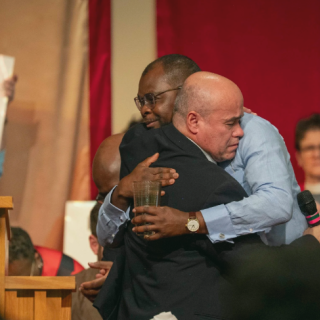Advertisement
Last week, Ayman Soliman and his attorneys filed a lawsuit challenging the United States Citizenship and Immigration Services’ (USCIS) unlawful termination of his asylum status. Yesterday, U.S. District Judge Jeffrey P. Hopkins issued a 14-day Temporary Restraining Order (TRO) and advised the parties that he could continue this relief once a new habeas petition is filed.
“This is a necessary reprieve that will prohibit the government from moving Ayman out of Ohio for the time being and allow us to amend the complaint to file an additional habeas action and provide additional briefing,” said Franchel D. Daniel, Immigration Senior Staff Attorney with the Muslim Legal Fund of America. Absent a TRO, there was nothing stopping the government from moving Ayman to a detention center outside of Ohio. Detention center shuffling oftentimes creates significant delays in immigration cases. It can also cause cases to be assigned to a different judge, which among other things changes the scheduling and makes it more difficult for them to meet with their attorneys.
Furthermore, this lawsuit disputes the notion that the Department of Homeland Security (DHS) on their own authority can terminate any asylum grant at any time, even if the person remains eligible for the asylum. No asylum approval will ever be final if this becomes the standard. Kathryn H. Brady, Immigration Department Head with the Muslim Legal Fund of America stated, “In Ayman’s case, DHS wants to be judge, jury, and executioner for his asylum status and foreclose others’ review of its decision. When the law and the facts are not on the government’s side, it is essential that a neutral judge can review the case. This is what we hope to address in the pending Administrative Procedure Act (APA) action.”
For now, Ayman’s removal proceedings will continue in the Cleveland Immigration Court before Immigration Judge Jennifer Reidthaler Williams, with the next master hearing scheduled for August 12 at 8am.
Ayman Soliman, a Cincinnati resident and former chaplain at Cincinnati Children’s Hospital, arrived in the U.S. in 2014 fleeing persecution in Egypt in retaliation for his freelance work with journalism crews. He was granted asylum after a thorough review by U.S. Citizenship and Immigration Services (USCIS). No terrorism-related concerns were raised at the time of his asylum grant.
On June 3, 2025, USCIS terminated Soliman’s asylum status, claiming that through his involvement with the charitable organization Al-Gam’iyya al-Shar’iyya (GS) he had provided “material support” to the Muslim Brotherhood (MB) — which the terminating asylum officer deemed an undesignated Tier III terrorist organization. The U.S. government has not designated the Muslim Brotherhood (MB) a terrorist organization and has never accused Mr. Soliman of participating in any criminal or terrorist activity. The asylum officer’s decision relies on two pre-2018 academic reports which USCIS alleges show links between GS and MB.
But the authors of these reports have submitted letters refuting USCIS’s interpretation, stating that GS is a decentralized, non-political charity with no organizational ties to MB and that the government misrepresented the reports. One author, Steven Brooke, an Associate Professor at the University of Wisconsin-Madison, emphasized that GS operates independently and cooperates with various groups and the Egyptian government for charitable purposes only. The other author, Marie Vannetzel, a researcher at France’s National Center for Scientific Research, described GS as a “para-public” service agency aiding Egypt’s underserved population, with any historical MB involvement limited and non-terrorist in nature.
Using these letters as exhibits, a new lawsuit filed by Mr. Soliman’s attorneys in U.S. District Court for the Southern District of Ohio, Western Division, argues that USCIS’s asylum termination lacks new evidence, contains factual errors, improperly shifts the burden of proof, and violates res judicata by re-litigating issues settled by USCIS’s grant of asylum in 2018. “This termination is not based on facts or law but on a misguided reinterpretation of old information,” said Robert A. Ratliff, Soliman’s attorney with Brennan, Manna & Diamond, LLC. “Ayman has built a life in Cincinnati, contributing to his community, and now faces deportation to a country where he risks torture and death. We’re fighting to restore his rightful asylum status.”
“The government’s assertions, although presented as fact, are actually a cascading series of layered and unsubstantiated assumptions. The government’s assumption stacking fails to meet its burden of proof,” said Franchel D. Daniel, Immigration Senior Staff Attorney with the Muslim Legal Fund of America.
Read about the broad and deep community support for Ayman Soliman, known as the “Interfaith Imam,” here.
En Español
Tribunal federal emita amparo contra traslado de periodista con asilo
de Lynn Tramonte
1 agosto 2025
traducción: NS
Los abogados de Ayman Soliman impugnaron la cancelación ilegal de su estado de asilo por parte del Servicio de Ciudadanía e Inmigración de Estados Unidos (USCIS). El juez federal de distrito Jeffrey P. Hopkins emitió una Orden de Restricción Temporal (TRO) por 14 días a partir del 31 de julio, e informó a las partes que el amparo se puede extender por medio de una nueva petición de hábeas corpus.
Con ello, el proceso continuará en la Tribunal Migratoria de Cleveland bajo la magistrada Judge Jennifer Reidthaler Williams, con audiencia calendarizada para el 12 de agosto a las 8 horas.
“Esta prórroga es necesaria para prohibir al gobierno de trasladar a Ayman fuera de Ohio por ahora, y nos permitirá modificar el escrito para presentar un recurso de hábeas corpus adicional, así como proporcionar evidencias nuevas”, declaró abogada de inmigración Franchel D. Daniel del Fondo Legal Musulmán Americana (MLFA). En ausencia de un orden de restricción temporal (TRO), el gobierno pudiera trasladar a Ayman a cualquier centro de detención fuera del territorio estatal de Ohio. En otros casos, la reubicación de detenidos suele generar retrasos significativos, así como da causa a que se reasignen los casos a un juez diferente, lo que modifica la programación y dificulta reunirse con sus abogados.
Su historia
El señor Soliman llegó a Estados Unidos en 2014 después de huirse de Egipto por la persecución en represalia por su trabajo con equipos periodísticos. Obtuvo asilo para radicarse en Cincinnati gracias a una revisión exhaustiva por parte del USCIS que no planteó preocupación relaciona con el terrorismo. En esa ciudad ohioana fungió como capellán del Hospital Infantil.
Leer aquí sobre el extenso y profundo apoyo comunitario que goza Ayman “Imán Interreligioso” Soliman.
De repente el 3 de junio de este año, el USCIS le canceló el estatus de asilo so pretexto que su participación en la organización de caridad Al-Gam’iyya al-Shar’iyya brindó “apoyo material” a la Hermandad Musulmana. El funcionario canceló el asilo considerando HM como una organización terrorista de Nivel III a pesar de que el gobierno estadounidense no ha designado a la Hermandad Musulmana como organización terrorista, ni tampoco ha acusado al Sr. Soliman de participar en ninguna actividad criminal o terrorista. La decisión del funcionario de asilo se basa en dos informes académicos anteriores a 2018 que, según el USCIS, muestran vínculos entre la beneficencia y la Hermandad.
No obstante, los mismos autores de dichos informes presentaron cartas que refutan la interpretación que impone el USCIS, ya que afirman que Al-Gam’iyya al-Shar’iyya es una organización benéfica descentralizada y apolítica, sin vínculos organizativos con la Hermandad Musulmán, y mostraron que el gobierno tergiversó los informes. Coautor Steven Brooke, profesor asociado de la Universidad de Wisconsin, enfatizó que ésta opera de forma independiente y coopera con diversos grupos y el gobierno egipcio únicamente con fines humanitarias. Por su parte, coautora Marie Vannetzel, investigadora del Centro Nacional de Investigación Científica de Francia, la describió como una agencia de servicios “parapúblicos” que ayudan a la población desfavorecida en Egipto, con una participación histórica limitada con la Hermandad y de naturaleza no terrorista.
Los abogados usaron estas cartas como pruebas documentales para interponer una acción nueva ante el Tribunal para el Distrito Sur de Ohio, División Oeste, con el argumento que la cancelación del asilo por parte del USCIS carece de nuevas evidencias, contiene errores fácticos, desplaza indebidamente la carga de la prueba y, también, viola res judicata, que significa volver a litigar cuestiones resueltas por la concesión original. “Esta cancelación no se basa ni en hechos ni en derecho, sino en una reinterpretación errónea de información anterior”, declaró el abogado de Soliman Robert A. Ratliff. “Ayman ha construido una vida en Cincinnati, contribuyendo a su comunidad, y ahora enfrenta la deportación a un país donde corre el riesgo de ser torturado y asesinado. Luchamos para restaurar su legítimo estado de asilo”.
“El gobierno presenta como hechos afirmaciones son en realidad no son más que una suerte de suposiciones ensambladas e infundadas. Su acumulación de suposiciones —declaró la abogada Daniel del Fondo MLFA— no cumple con la debida carga de la prueba.”
Las implicaciones
Esta demanda pone en telón de juicio el concepto que el Departamento de Seguridad Nacional (DHS), por su propia potestad, tenga fuero para cancelar cualquier concesión de asilo en cualquier momento, incluso cuando continúa observando los requisitos. Si semejante práctica se convirtiera en la norma, ninguna aprobación de asilo será definitiva. Kathryn H. Brady, jefa del Departamento de Inmigración del Fondo declaró: “En el caso de Ayman, el DHS pretende ser juez, jurado y verdugo sobre su estatus de asilo e impedir que otros revisen su decisión. Cuando la ley y los hechos no favorecen al gobierno, es esencial que un juez desinteresado revise el caso. Esto es lo que esperamos abordar en la acción pendiente bajo la Ley de Procedimiento Administrativo (APA)”.



